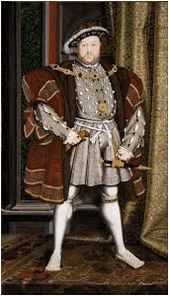 The tyrant King Henry VIII
The tyrant King Henry VIII Editor's Note: The following is a modified abstract of a paper presented at a conference held by Christ the King Law Center (CKLC) on October 8, 2016 titled Make America Catholic Again!
While a monarchy may be, at least in theory, the best form of government a monarch could become a tyrant and his government could turn into a tyranny which is the worst of all governments. Thomas Aquinas wisely wrote that "[j]ust as the government of a king is the best, so the government of a tyrant is the worst." [1] Thus the Angelic doctor indicated that it may be prudent to temper a monarchy with elements of the other forms of government in order to safeguard against a potential tyranny and fulfill man's needs. [2]
Some contemporary thinkers have latched onto this idea of a mixed or tempered form of government as justification for the American constitutional system and they may have a point. The federal government is structured with three branches of government: the executive, the legislative, and the judicial branches. The executive branch may be considered the monarchical branch as it is ruled by one man-the President. The legislature may be considered the branch ruled by many individuals as there are a total of 535 congressman in the legislature (100 senators and 435 representatives) and they are elected by the people of their states and congressional districts. And the judicial may be considered the branch ruled by the few thus hopefully becoming an aristocracy.
Unfortunately-and apparently more often than not-the American government functions unjustly. Presidents have forced the Church and her institutions to have health insurance plans that fund contraceptives and abortion inducing drugs and refused to sign laws limiting abortions. Congress has passed a massive universal healthcare system run by the federal government which permits funding of abortions and the Supreme Court has struck down laws against abortion, contraception, and same sex "marriages".
Furthermore professor Brian McCall of the University of Oklahoma College of Law has dissented from the idea that the United States system of government is a real mixed form of government. He writes:
- "[T]he idea of a monarchy in a government is much more than a central executive figure such as a president. One of the benefits of a monarch is that his governing power is more obviously seen as proceeding from God. He is not beholden to an electoral cycle or constant change of office. One of the main roles a monarch can play in a mixed form of government is to be a conscience standing outside the realm of electoral politics who can act as a guardian of the divine and natural law when the few or the many may attempt to pervert the common good. The presidency of the United States is not and has never been a monarchy thus understood. America may at some point in its history been close to an aristocracy or a polity (although personally I think it has mostly been an oligarchy or a democracy), but it has never been a monarchy in any way." [3]
With this in mind a monarchy in an ideal Catholic mixed government should be more than a mere executive governor like a President, Chancellor, or Prime Minister who can be removed by an election but someone who can maintain his or her office for life.
[1] Aquinas, St. Thomas. On Kingship To the King of Cyprus, trans. Gerald B. Phelan. East Toronto, Ontario, Canada: Mediaeval Studies; 1949. Google book service. Web. 13 Apr. 2018.
[2] Cf. St. Thomas Aquinas, On the Governance of Rulers, Gerald Phelan, trans. (Toronto: St. Michael's College Philosophy Texts, 1935), pp. 37-39.
[3] B. McCall, To Build the City of God: Living as Catholics in a Secular Age 239-240 (2014).
 RSS Feed
RSS Feed
